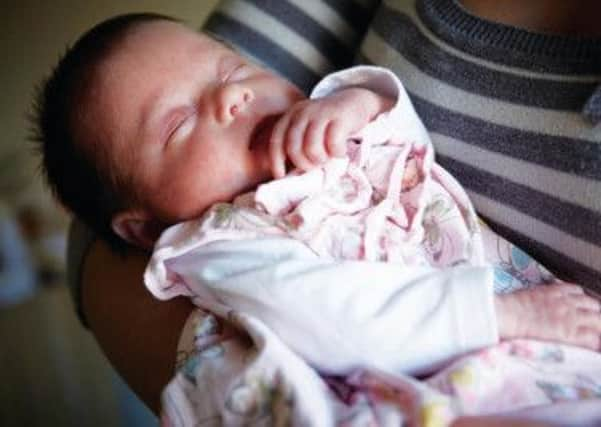How constant crying is pushing parents to the brink


Most new mothers hope that once their baby is born, maternal instinct will take over.
Except it doesn’t always work out that way and those first sleep deprived few months, when every waking moment feels like it’s punctured by a high pitched scream, can seem more of an ordeal than a blessing.
Advertisement
Hide AdAdvertisement
Hide AdFor most, the moment passes, but according to NSPCC research around 200 babies a year in the UK suffer from serious head injuries as a result of being shaken, hit or thrown and in a significant number of cases, crying has been cited as the trigger. It’s one of the reasons why the charity is today launching its Coping with Crying programme in eight areas across Yorkshire and the Humber.
“Crying is an issue that affects all families with a young baby, but for some it can be very serious,” says Chris Cuthbert, head of strategy and development for the NSPCC. “Research shows that in the worst cases, babies’ crying is associated with parental stress, depression and relationship problems.
“Crying can disrupt parents’ developing bonds with their babies and, however unintentional, in extreme cases can result in them inflicting serious harm. In one study, more than half the mothers questioned said crying made them feel like harming their child.”
Taking a leaf from a programme in America which had reduced the number of shaken babies by 47 per cent through educating parents about the pressures of crying, the NSPCC launched its film which it is hoped will reduce the risks in the UK. Over the last two and a half years a pilot scheme has been operating in 24 hospitals and birthing units across the UK.
Advertisement
Hide AdAdvertisement
Hide AdThe film, which includes advice on soothing crying babies and information of the dangers of shaking very young children, has so far been seen by more than 30,000 parents and it is now being expanded to other parts of the country. In Yorkshire, eight locations have been selected including Bradford, Barnsley, York and Kirklees.
“I only saw the film once and that was the day we were leaving hospital,” said one mother involved in the pilot scheme. “The main thing I remember from the film was the part about the baby’s head rolling back and what damage this can do.
“It played on my mind, especially when it was four or five in the morning, when you’re suffering from lack of sleep and the baby’s just screaming in your ear. I can remember thinking, ‘Don’t shake him, don’t shake him’.
Over the next 18 months it is estimated the 10 minute long film, which has been dubbed into a number of different languages, will reach a further 45,000 parents. Once further research has been done into the impact of the advice it is hoped it will eventually be available to every parent of a new born baby in the UK.
Advertisement
Hide AdAdvertisement
Hide Ad“We know that because of the busy nature of maternity units and staff shortages only around a third of new parents had the opportunity to see the film,” says Mr Cuthbert. “However, it has also been reported that infant crying is the most common reason why parents seek help when they have a small baby and in 2001 it was estimated that the cost to the NHS was £65m. This is a ground-breaking new programme based on the best international evidence.
“It is a relatively simple and low cost intervention. It is critically important that we support families in reducing street during the significant changes which come with the birth of a new baby.
“Many parents who watched the film said it helped them realise that their experiences of being a parent were normal and as a result they were less likely to feel alone. Most importantly, our studies show that the film is also helping to keep babies safe.”